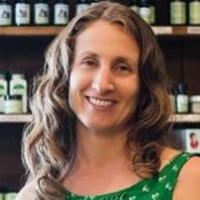
Unlike many of us, John-Paul Maxfield and Matt “Soil Shaman” Celesta of Waste Farmers, a certified B Corporation in Denver, Colorado, are obsessed with soil. You might even call them dirt nerds.
Waste Farmers is the umbrella where, as John-Paul (founder and CEO) explains, “We get to have this really ethereal big purpose, which is to live authentic lives and change the world.”
Under that umbrella sits Batch:64, Maxfield’s and a growing number of other brands. I left my conversation with John-Paul and Matt feeling inspired and optimistic about the ability of entrepreneurs like them to build successful businesses, while also fundamentally improving our global environment.
John-Paul is an ambitious and busy man, and soil is the foundation of his efforts. Nutrient-dense, rich dirt gives us healthier plants and—ultimately—a healthier planet. Maxfield’s makes its high-quality soil available to small-scale gardeners and urban farmers, while Batch:64 sells soil to cannabis growers. In addition, John-Paul spearheaded the creation of the Organic Cannabis Association and is preparing to launch a food brand, Beyond 12 Foods, in 2016. He explains, “It’s called beyond 12 Foods because there are 30,000 edible species of plants on the planet, 200 of which modern agriculture focuses on, and 90% of our diet comes from just 12 plants.”
Beyond 12 Foods will focus first on amaranth and is working with farmers in Oaxaca, Mexico, to reintroduce the plant in the US, where we cultivate only 3,000 domestic acres of this healthy, sustainable crop. There are many reasons John-Paul is embarking on building a consumer food brand, not the least of which is the fact that “big food” (major packaged-food companies) lost $4 billion in market share last year, and he believes people are looking for authentic brands they can trust. John-Paul told me, “We’re launching a food brand not for the sake of launching a food brand, but because we’ve got to change what people are eating.”
He hopes to help increase the demand for more-diverse foods so farmers will begin growing them. To round things out, Waste Farmers also has a 20-person community supported agriculture CSA program, and the company hosts regular educational potlucks at Waste Farmers’ headquarters on topics ranging from foraging edible weeds to seed starting.
Musings on Soil and Food
John-Paul and Matt are eager for more people to learn about soil because they think an appreciation of the most fundamental element on the planet will be a steppingstone to caring about many of today’s important issues, including climate change, resource utilization, and population growth. John-Paul says, “We’re enamored with soil. We’re immersed in it mentally and physically, but most people don’t give a crap.”
Why does soil matter? Matt enlightens, “I think soil matters because that’s where the fertility for most farms comes from. We believe that as you’re farming, you’re not necessarily farming plants; you’re farming soil. Then the spoils of that becomes your food and nutrition. A lot of modern-day practices focus on the plant and plant growth. What that ends up doing is depleting the soil and ultimately depleting the produce. The majority of food being grown and sold nowadays are skeletons of their former selves and are not living up to their full nutrient density potential.”
Matt, clearly impassioned by the topic, goes on to explain that it’s difficult to spot a malnourished carrot, yet most of the ones you see on grocery store shelves are just that. Waste Farmers is not satisfied with this reality and the company is focused on using soil to make change.
Role of Technology in Agriculture
John-Paul and Matt think farming in the future will favor small-scale, decentralized producers. They expect an increased focus on nutrient-dense crops, with more people learning how to grow their own food and actually putting that knowledge into practice. Their vision for the future relies heavily on technology for education and information sharing, but not for replacing natural processes and systems.
When I asked John-Paul and Matt what they thought of the farm that sits 115 feet below the streets of London, they had a tepid response. John-Paul remarked, “I love technology and I love tech entrepreneurs and everything they’ve done, but I think that they’re outrageously overconfident in their ability to solve everything.” He says he’s a bit of a Luddite, but not old-fashioned, commenting, “There’s a saying: ‘When you hear hoof patter, don’t think zebra.’ Don’t think the most complicated thing. There are literally 40 million acres of turf. If you converted a tenth of that—or half—you could feed more than the population of the United States.” He’s critical of the notion that technology will solve all of our problems, and he’s critical of our inclination to turn to technology first, before considering simple solutions.
Matt is also a fan of natural systems and simplicity. “I think the more complicated you make the system, the more likely things are going to fall apart and break. I always think of hybrid cars. These are really, really complicated vehicles that, as they age, end up having lots of issues. The idea behind a hybrid makes tons of sense, but when you own it and it’s breaking down on you, you kind of just want a reliable vehicle sometimes. I worry about food-growing systems that are too dependent on lights, pumps, and ventilation. What happens if something breaks? How susceptible are you going to be? It’s really hard to adapt out of those systems.” Matt also takes a moment to talk about the experience of the plants. He points out, “For a tomato plant living 115 feet below the earth’s surface in a sterile environment, it’s like prison. We wouldn’t grow animals there, but we think it’s okay to grow plants.”
As he muses about the future, John-Paul imagines a world where we can use technology to share information and educate people about how to live healthier lives on a healthier planet. He imagines a classification system that helps consumers understand the nutrient density of the food they buy. The classification would go beyond organic, noting the health of the soil where the food was grown. He asserts that informed consumers move markets, and he wants to do more to help consumers truly understand where healthy fruits and veggies come from and the role that rich, diverse soil plays in this important process. This classification system, John-Paul speculates, would help more farmers care more about the health of their soil, and not just about the resulting crops.
John-Paul expresses his trepidation about our attempts to industrialize biological things, like the food we eat. He says, “As much as we try to standardize agriculture and apply technology to fight against the natural world, we are running a race we can’t win.”
Tips for the Aspiring Urban Farmer
I asked John-Paul and Matt for some tips for anyone just getting started growing their own food. Below are a few simple suggestions:
1. Start small.
No need to bother with seed starting at first; just buy some organic seedlings from the farmers market or a garden store and get comfortable growing seedlings. Plant your seedlings in a little in-ground bed that you make or buy, or in a large pot.
2. Start with food you love to eat.
If you grow something you love, you’re much more likely to stay motivated with your small-farming efforts. For example, if you love pizza and salsa, a tomato plant and some herbs might be a good place to start.
3. Watering is key.
Watering is especially important if you live in a drier climate, watering is critical for plant growth, so carve out the time to do it consistently. If you’re headed out of town, make sure you ask a friend to water your plants for you. John-Paul explains, “I think watering is a big issue for people—either over- or under-.” Irrigation can get complicated, so it’s probably best to begin by hand watering. To simplify the process, start your garden in a pot near your kitchen so you’re reminded to water and monitor the plants’ progress.
4. It gets easier as they grow up.
It’s as true for baby humans as it is for baby plants: It gets easier. Although getting your plants established requires some up-front work, caring for them as they mature becomes much less time-consuming.
5. Embrace mistakes.
John-Paul contends that nobody really knows what they’re doing, so enjoy the process. Don’t expect to do it perfectly, and learn from your mistakes. A garden journal (link) might help with this process.
~
A few book recommendations from Waste Farmer’s impressive bookshelf:
Gardening: Square Foot Gardening and How to Grow More Vegetables by John Jeavons.
Soil: The Secret Life of Soil
Grow by Steven Grace
~
Author:Mara Rose
Editor: Katarina Tavčar
Photo: Author’s Own






Read 0 comments and reply